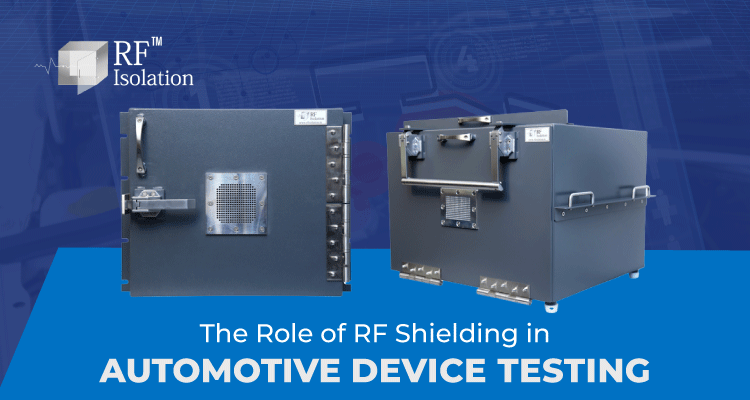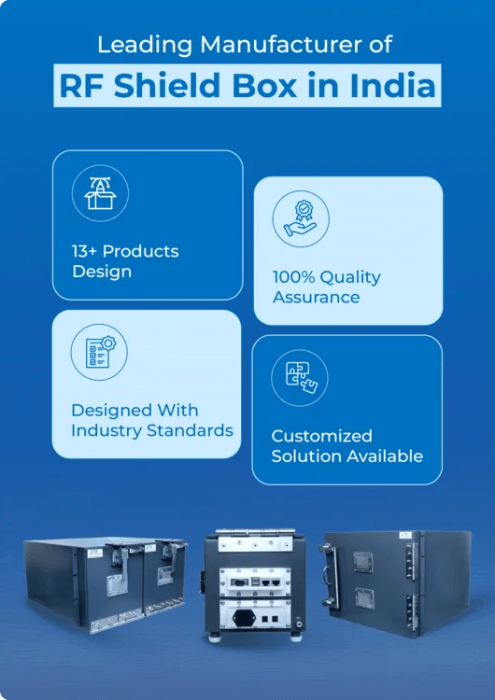
The Role of RF Shielding in Automotive Device Testing
In the high-octane arena of automotive development, countless innovations battle for attention. Yet, one crucial element often goes unnoticed – RF shielding in automotive devices. Ensuring flawless performance of electronic components is necessary.
Modern vehicles are engineered with intricate electronic systems, each vital for safety, efficiency, and comfort. To guarantee their reliability, rigorous testing is necessary. This is where RF shielding steps onto the racetrack, playing a crucial role in achieving accurate and dependable results of automotive testing.
Let’s explore the challenges caused by Electromagnetic Interference(EMI) and how RF shield box creates a controlled environment for automotive testing.
What is RF Shielding and Its Importance in Automotive Testing
Modern vehicles are no longer just about engines and wheels, they’re packed with complex electronic systems that control everything from fuel injection to driver assistance features. To ensure these systems function flawlessly, they undergo rigorous testing.
But what if external radio waves or the device’s own signals interfere with the testing process? No chance with RF shielding.
RF shielding refers to the practice of attenuating or blocking radio frequency (RF) signals. It’s achieved by using materials that either reflect or absorb these waves, creating a controlled environment.
In automotive testing, RF shielding plays an important role for two main reasons:
1. Preventing External Interference
External radio waves, such as those from cell phone towers or nearby broadcasting equipment, can disrupt the delicate signals of the device under test. This can lead to inaccurate test results and potentially mask underlying issues. RF shield box acts as a barrier, ensuring the device is evaluated based solely on its own functionality.
2. Containing Internal Signals
Electronic devices themselves generate RF signals during operation. If these signals are allowed to leak out of the testing chamber, they can interfere with other nearby equipment or testing setups. RF shield box helps contain these internal signals, preventing them from affecting other tests or the surrounding environment.
Increasing Complexities in Electronic Devices and Need For Automotive Testing
The increasing complexities in electronic devices, especially in automotive technology, have necessitated more rigorous testing procedures. As vehicles become more reliant on electronic systems for everything from engine management to infotainment and autonomous driving features, the need for robust testing becomes paramount.
To address these challenges, automotive manufacturers and suppliers invest heavily in specialized testing equipment, methodologies, and skilled personnel. This ensures that electronic components meet the high standards required for modern vehicles, thereby enhancing safety, reliability, and performance.
Reasons why RF shielding in automotive devices is necessary:
1. Safety Assurance
Electronic components in vehicles directly impact safety critical systems such as braking, steering, and collision avoidance. RF shield box ensures these systems function correctly under all conditions.
2. Reliability
Vehicles must operate reliably across a wide range of environmental conditions (temperature, humidity, vibration, etc.). Automotive testing verifies that electronic components can withstand these conditions without failure.
3. Compliance
Automotive electronics must meet stringent regulatory standards and industry norms (such as ISO standards). Automotive testing ensures compliance with these requirements.
4. Performance Optimization
RF shielding in automotive devices helps optimize the performance of electronic systems, ensuring they operate efficiently without draining excessive power or causing undue wear on mechanical components.
5. Integration Challenges
Modern vehicles have complex networks of electronic systems that must seamlessly integrate and communicate with each other. Automotive testing identifies and resolves integration issues.
6. Software Validation
With the increase in software-driven functionalities (like advanced driver assistance systems and infotainment), automotive testing ensures that the software behaves as expected and is free from bugs or vulnerabilities.
7. Customer Satisfaction
Reliable electronics contribute to overall vehicle quality and customer satisfaction. RF shielding in automotive devices helps identify and rectify potential issues before vehicles reach consumers.
RF Isolation - Leading RF Shield Box Manufacturer
By partnering with us, automotive engineers can gain access to a diverse range of RF shielding solutions catering to the specific demands of the automotive industry. Ensure a controlled environment free from external and internal RF interference with us.

